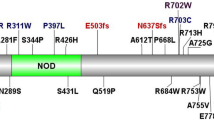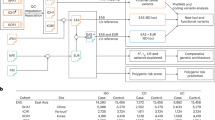Abstract
Independent genome-wide association studies highlighted the function of CLEC16A/KIAA0350 polymorphisms modifying the risk to either multiple sclerosis (rs6498169) or type 1 diabetes (rs2903692). This C-type lectin gene maps to a linkage disequilibrium block at 16p13 and a functional role of this gene could be envisaged for other immune-related conditions, such as inflammatory bowel disease (IBD). The present study, aimed at investigating the association of those two polymorphisms with IBD, included 720 IBD patients and 550 ethnically matched healthy controls. The effect of rs2903692 previously described in diabetes was observed specifically for Crohn's disease (CD) patients lacking the main susceptibility factor described to date, that is, three polymorphisms within another pattern recognition gene, NOD2/CARD15 (NOD2− vs NOD2+ CD patients, G vs A: P=0.008; OR (95% CI)=1.54 (1.10–2.15); NOD2− CD patients vs controls: P=0.008; OR (95% CI)=1.37 (1.08–1.73)). Replication of these findings was performed in independent Spanish cohorts of 544 IBD patients and 340 controls and the combined data yielded significant differences (405 NOD2− vs 204 NOD2+ CD patients, G vs A: P=0.0012; ORM-H (95% CI)=1.49 (1.17–1.90); NOD2− CD patients vs controls: P=0.0007; ORM-H (95% CI)=1.35 (1.13–1.60)). The pooled analysis of the ulcerative colitis patients vs controls also yielded a significant risk (P=0.0005; OR (95% CI)=1.52 (1.19–1.93)). These data would suggest that microbial recognition through different pathways seems to converge in the development of these polygenic bowel diseases.
Similar content being viewed by others
Log in or create a free account to read this content
Gain free access to this article, as well as selected content from this journal and more on nature.com
or
References
Hugot JP, Chamaillard M, Zouali H et al: Association of NOD2 leucine-rich repeat variants with susceptibility to Crohn's disease. Nature 2001; 411: 599–603.
Ogura Y, Bonen DK, Inohara N et al: A frameshift mutation in NOD2 associated with susceptibility to Crohn's disease. Nature 2001; 411: 603–606.
Herskovits AA, Auerbuch V, Portnoy DA : Bacterial ligands generated in a phagosome are targets of the cytosolic innate immune system. PLoS Pathog 2007; 3: e51.
Hafler DA, Compston A, Sawcer S et al: Risk alleles for multiple sclerosis identified by a genomewide study. N Engl J Med 2007; 357: 851–862.
Hakonarson H, Grant SF, Bradfield JP et al: A genome-wide association study identifies KIAA0350 as a type 1 diabetes gene. Nature 2007; 448: 591–594.
Todd JA, Walker NM, Cooper JD et al: Robust associations of four new chromosome regions from genome-wide analyses of type 1 diabetes. Nat Genet 2007; 39: 857–864.
Zoledziewska M, Costa G, Pitzalis M et al: Variation within the CLEC16A gene shows consistent disease association with both multiple sclerosis and type 1 diabetes in Sardinia. Genes Immun 2008; 10: 15–17.
Robinson MJ, Sancho D, Slack EC, LeibundGut-Landmann S, Reis e Sousa C : Myeloid C-type lectins in innate immunity. Nat Immunol 2006; 7: 1258–1265.
McGreal EP, Martinez-Pomares L, Gordon S : Divergent roles for C-type lectins expressed by cells of the innate immune system. Mol Immunol 2004; 41: 1109–1121.
Franchimont D, Vermeire S, El Housni H et al: Deficient host–bacteria interactions in inflammatory bowel disease? The toll-like receptor (TLR)-4 Asp299gly polymorphism is associated with Crohn's disease and ulcerative colitis. Gut 2004; 53: 987–992.
Pierik M, Joossens S, Van Steen K et al: Toll-like receptor-1, -2, and -6 polymorphisms influence disease extension in inflammatory bowel diseases. Inflamm Bowel Dis 2006; 12: 1–8.
Torok HP, Glas J, Tonenchi L, Mussack T, Folwaczny C : Polymorphisms of the lipopolysaccharide-signaling complex in inflammatory bowel disease: association of a mutation in the Toll-like receptor 4 gene with ulcerative colitis. Clin Immunol 2004; 112: 85–91.
Underhill DM : Collaboration between the innate immune receptors dectin-1, TLRs, and Nods. Immunol Rev 2007; 219: 75–87.
Lennard-Jones JE : Classification of inflammatory bowel disease. Scand J Gastroenterol Suppl 1989; 170: 2–6; discussion 16–19.
Oliver J, Marquez A, Gomez-Garcia M et al: Association of the macrophage migration inhibitory factor gene polymorphisms with inflammatory bowel disease. Gut 2007; 56: 150–151.
Nunez C, Rueda B, Martinez A et al: A functional variant in the CD209 promoter is associated with DQ2-negative celiac disease in the Spanish population. World J Gastroenterol 2006; 12: 4397–4400.
Nunez C, Oliver J, Mendoza JL et al: CD209 in inflammatory bowel disease: a case–control study in the Spanish population. BMC Med Genet 2007; 8: 75.
Chinen T, Kobayashi T, Ogata H et al: Suppressor of cytokine signaling-1 regulates inflammatory bowel disease in which both IFNgamma and IL-4 are involved. Gastroenterology 2006; 130: 373–388.
Inagaki-Ohara K, Sasaki A, Matsuzaki G et al: Suppressor of cytokine signalling 1 in lymphocytes regulates the development of intestinal inflammation in mice. Gut 2006; 55: 212–219.
Mansell A, Smith R, Doyle SL et al: Suppressor of cytokine signaling 1 negatively regulates Toll-like receptor signaling by mediating Mal degradation. Nat Immunol 2006; 7: 148–155.
Martinez A, Sanchez-Lopez M, Varade J et al: Role of the MHC2TA gene in autoimmune diseases. Ann Rheum Dis 2007; 66: 325–329.
Wellcome Trust Case Control Consortium: Genome-wide association study of 14 000 cases of seven common diseases and 3000 shared controls. Nature 2007; 447: 661–678.
Mathew CG : New links to the pathogenesis of Crohn disease provided by genome-wide association scans. Nat Rev Genet 2008; 9: 9–14.
Acknowledgements
Alfonso Martínez holds a research contract of the Spanish Health Ministry (04/00175). Jezabel Varadé is a fellow and Elena Urcelay works for the Fundación para la Investigación Biomédica-Hospital Clínico San Carlos. This work was supported by grants from Fundación Mutua Madrileña, Fundación Ramón Areces, FIS PI07/0369, FIS PI07/0353, SAF2006-00398 and CTS-1180.
Author information
Authors and Affiliations
Corresponding author
Rights and permissions
About this article
Cite this article
Márquez, A., Varadé, J., Robledo, G. et al. Specific association of a CLEC16A/KIAA0350 polymorphism with NOD2/CARD15− Crohn's disease patients. Eur J Hum Genet 17, 1304–1308 (2009). https://doi.org/10.1038/ejhg.2009.50
Received:
Revised:
Accepted:
Published:
Issue date:
DOI: https://doi.org/10.1038/ejhg.2009.50
Keywords
This article is cited by
-
CLEC16A interacts with retromer and TRIM27, and its loss impairs endosomal trafficking and neurodevelopment
Human Genetics (2023)
-
JAK/STAT inhibitor therapy partially rescues the lipodystrophic autoimmune phenotype in Clec16a KO mice
Scientific Reports (2021)
-
The Genetic Contribution to Type 1 Diabetes
Current Diabetes Reports (2019)
-
Genetic sharing and heritability of paediatric age of onset autoimmune diseases
Nature Communications (2015)
-
Multiple sclerosis-associated single-nucleotide polymorphisms in CLEC16A correlate with reduced SOCS1 and DEXI expression in the thymus
Genes & Immunity (2013)



